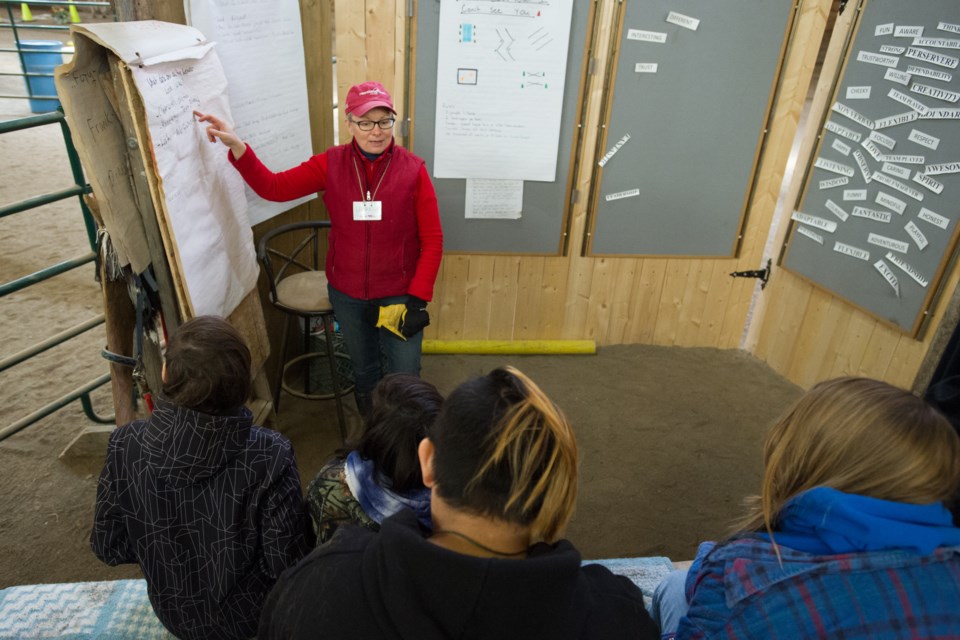For eight years, Laurel Griffin has been working with at-risk youth through equine-assisted learning (EAL) therapy.
Located 20 minutes west of Cochrane, Spirit Winds Ranch serves as a west Rocky View provider of the EAL program. There are also similar EAL providers in the north, south, and east.
Griffin’s involvement stemmed from a streak of suicides in the community of Cochrane in 2014, which she said shook her.
“I had a rough childhood growing up and a tough family life, and the horses were an escape for me,” Griffin said.
This made her realize she had something to offer to kids who are struggling.
“I wanted to see how I could be of service with my land, my horses, my knowledge, to my local community of Cochrane.”
How she could help didn’t become clear until she came across a magazine featuring the top Canadian EAL courses. After taking two courses and applying to be a service provider, she was ecstatic to be chosen to offer her therapy services at her ranch.
“It just shifted the direction of my farm,” she said. “I had an industrial agricultural farm. I had 250 head of horses here.”
While she knew what it took to teach someone how to safely ride a horse, she knew that wasn’t the right direction for kids who were already under stress. The course she currently teaches doesn’t involve horseback riding, instead it teaches youth to build a relationship with the animal while working with them at eye level.
Kids are faced with challenges set up in the arena and work through a number of different modules.
The senior horses are donated to the ranch and are trained before they get to work with kids.
Griffin is acutely aware of each of the horse's history and how to address issues.
“It doesn't mean they're perfect, but it means that they're steady, present, available, calm, curious, confident,” she said. This ensures the horse can handle being around individuals who may be nervous.
Griffin says she provides services for 13 schools in Cochrane.
“We get the kids that are the most vulnerable, the most marginalized, the most at risk,” she said.
Some of the youth have been through a gamut of therapies and are skeptical when they first arrive, but Griffin said this program gives them hope.
Volunteers and organizers of the program don’t know the background of the kids or what they’re currently going through, and they don’t need to, Griffin said.
“We treat them with respect and we interact on a level playing field,” she said. “We don't treat them like kids. We treat them like adults.”
Working with a large animal isn’t completely safe and there’s an edge of danger that requires some tough learning and support.
“We help them find a way of working through the problems that they're being asked to solve with positive reinforcement and some safety,” she said, adding they have to learn to be horse interpreters. “We [can] see the kids becoming more and more confident and the food that comes back to your own soul is just inexplicable.”
She added that volunteering and assisting youth has been a remarkable experience.
“All of this happening, it's the most joyous thing I could do,” Griffin said. “It's the best thing I've done in my life.”
Even her senior horses have been given a new lease on life by interacting with youth.
“They look at these kids with marvel,” she said.
Learning the language of horses
Through sessions, youth learn how to speak the horse’s language, which in turn teaches them about social cues. Verbal and nonverbal communication is explored and helps build a sense of presence and conduct in their relationships.
Griffin noted kids become really good at watching body language and interpreting situations. In turn this also teaches them about self-regulation.
Roughly 1,500 kids have gone through the program in the Cochrane area with help from funding raised by community groups.
Griffin said teacher and parent feedback has been positive. One letter noted that the program provided opportunities for students to learn about healthy boundaries and respectful relationships with the horses.
Youth have been witnessed repairing relationships in their own lives and taking responsibility for their actions as a result of the program. They learn to foresee challenges, adapt to problems, and recognize how to apply lessons to their reality.
The program was said to be a genuine tipping point for many students when it came to their engagement, both academically and socio-emotionally.
To check out the program or provide a donation to keep the program running, head to https://spiritwindsranch.ca/



